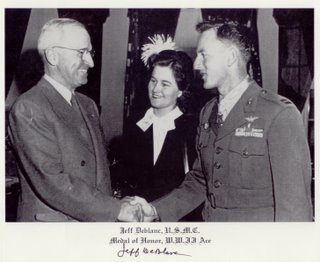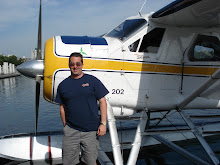Jefferson Deblanc 1921-2007

Jeff DeBlanc was born in Lockport, Louisiana on February 15, 1921. He joined the Navy and entered flight training in July 1941. He then transferred to the Marine Corps upon graduation on April 3, 1942 where he was then assigned to North Island in San Diego.
Jeff joined VMF-112 “Wolfpack” in October 1942 and departed ten days later to the Solomon Islands. With less than ten hours of flight time in the Wildcat, Jeff would see his first aerial combat. In his first air battle on November 12th, Jeff shot down two Japanese “Betty” bombers and received credit for another as a probable.
Jeff was a member of the famous “Cactus Air Force”. Jeff and his fellow Marine and Navy pilots would fly and fight almost every day against the on coming Japanese that were trying to take back the island run ways that the Marines now occupied. Jeff and the other pilots of the “Cactus Air Force” would take off and land on their airfield under small arms fire along with cannon and mortar fire from the Japanese hiding in the surrounding jungles.
In the Pacific the Japanese made great use of float planes which Jeff claimed his first on December 18th. On January 31, 1943, Jeff was escorting Navy and Marine SDB’s and Avengers to attack Japanese shipping up the “Slot”.
Jeff caught an enemy float planes on the tail of an SBD’s and dispatched the aircraft. The Wildcat that Jeff was flying was not his normally assigned aircraft. This was a long flight and even though his aircraft carried external drop tanks, his Wildcat was sucking fuel at an alarming rate.
The attack from Zero’s and float planes followed the American aircraft as they regrouped and were returning to base. Jeff was covering the bombers escape knowing that he may not have enough fuel to return to base.
Looking over his shoulder, Jeff saw more Zero’s approaching from the rear. He knew that the Zero’s would attack the bombers and claim the lives of more of his fellow aviators. Jeff turned his stubby fighter around and attacked the Zero’s head on knowing that now he would not make it back to base. Jeff’s Wildcat was riddled from machine gun and cannon fire from the Zero’s and Jeff was forced to bail out.
As he fell, Jeff knew that if he could make it to one of the Islands he could survive comfortably in the jungles. Growing up as a boy in Louisiana, Jeff came equipped with the natural skills of survival. As Jeff floated in his parachute, he also though about his fellow aviators who were returning safely to base and of the two float planes and three Zero’s that had fallen to his guns.
Jeff was able to swim to one of the Islands and hide until friendly natives found him and keep him safe until he was rescued thirteen days later. For Jeff’s decision to defend his fellow aviators against all odds, he would be awarded the Medal of Honor.
Jeff returned to the States and became an instructor and later returned to the Pacific with VMF-422 where Jeff would score his last victory of a Val dive bomber on May 28th.
Jeff retired as a Colonel in 1972 from the Marine Corps Reserve. During his military service he was credited with nine confirmed aerial victories and one probable. He was decorated with the Medal of Honor, Distinguished Flying Cross, Purple Heart and the Air Medal with 4 Gold Stars.
Jeff is the 26th highest scoring Marine Ace.


<< Home